Indigenous Peoples Day/Columbus Day
Because of the Indigenous Peoples Day/Columbus Day holiday, this is the last issue of Shelf Awareness until Tuesday, October 15. See you then!
Because of the Indigenous Peoples Day/Columbus Day holiday, this is the last issue of Shelf Awareness until Tuesday, October 15. See you then!
Hurricane Milton swept across Florida this week, bringing high winds, storm surges, heavy rain and multiple tornadoes to a state still in recovery mode from Hurricane Helene. Some indie bookstores have been checking in on social media, including:
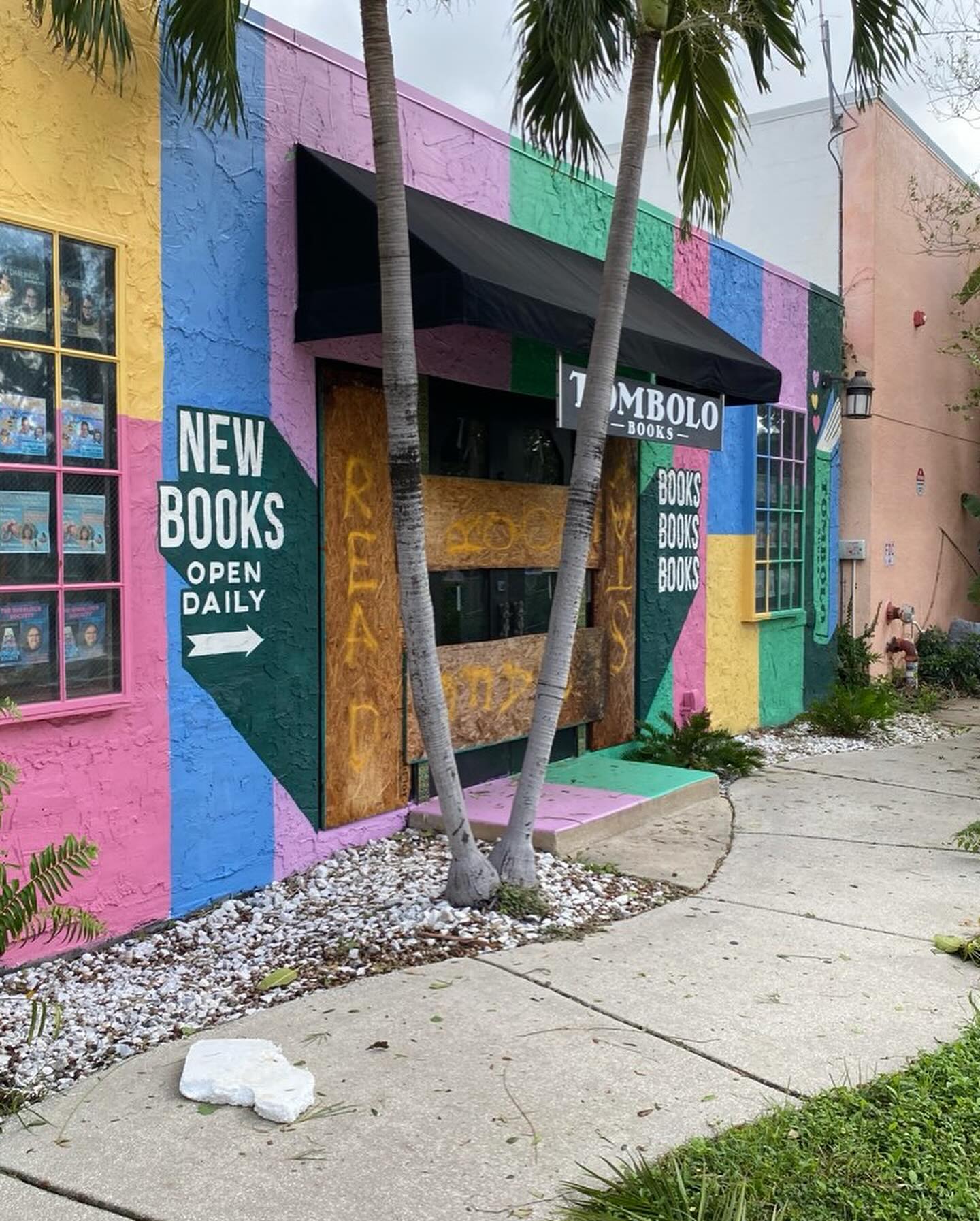 Tombolo Books, St. Petersburg: "Just a quick note to say the bookstore is safe and mostly dry. Power is out, internet is out, cell service is spotty. About 5 of our booksellers evacuated and we're staying positive while we await news that they are all safe. We love you St Pete!"
Tombolo Books, St. Petersburg: "Just a quick note to say the bookstore is safe and mostly dry. Power is out, internet is out, cell service is spotty. About 5 of our booksellers evacuated and we're staying positive while we await news that they are all safe. We love you St Pete!"
MacIntosh Books + Paper, Sanibel: "#hurricanemilton has passed and we're awaiting news about when it will be safe to return. I'm breathing and hoping and praying that the recovery is quicker this time around. I'm also distracting myself with books, my favorite refuge.... Thank you for your support! I'm grateful for blue skies, good friends and the safety of our family."
Portkey Books, Safety Harbor: "Portkey Books is fine but without power. How are you doing, friends?"
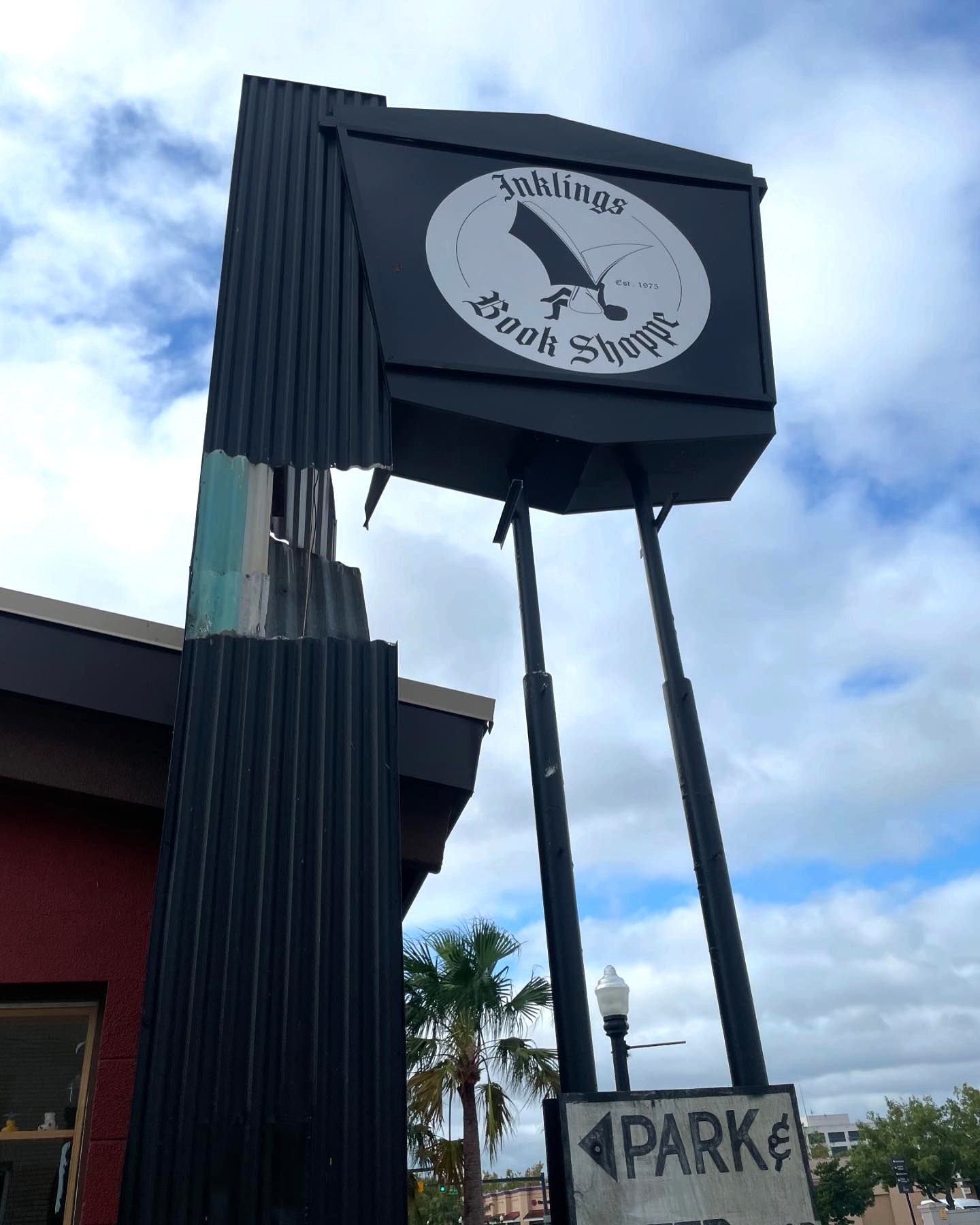 Inklings Book Shoppe, Lakeland: "Our sign and building endured some damage from Milton, but is doing great overall. We're so thankful! The only Milton we want to see is on our bookshelves! Our hearts and prayers are with our customers and beautiful city. We will be open for normal hours Friday, October 11 and we will have storytime at 10am if your littles are getting cabin fever! Also apparently we left our Open sign on throughout the hurricane, so hopefully you didn't try to stop by!"
Inklings Book Shoppe, Lakeland: "Our sign and building endured some damage from Milton, but is doing great overall. We're so thankful! The only Milton we want to see is on our bookshelves! Our hearts and prayers are with our customers and beautiful city. We will be open for normal hours Friday, October 11 and we will have storytime at 10am if your littles are getting cabin fever! Also apparently we left our Open sign on throughout the hurricane, so hopefully you didn't try to stop by!"
Pressed Books & Coffee, Lakeland: "We are glad to be able to reopen tomorrow for regular business hours 8am-5pm. Everyone doing ok? Come in and see us, we’d love to check in."
Copperfish Books, Punta Gorda: "Milton tried, but he didn't get in. We're so happy to report that Copperfish Books had no water intrusion and our team is ok. We'll be back to business as soon as power returns and we can put the store back in order. Hoping for a Saturday reopening but it may be Tuesday. We'll keep you posted. To all residents and businesses affected and cleaning up from the storm, we send our love and hopes for a speedy recovery."
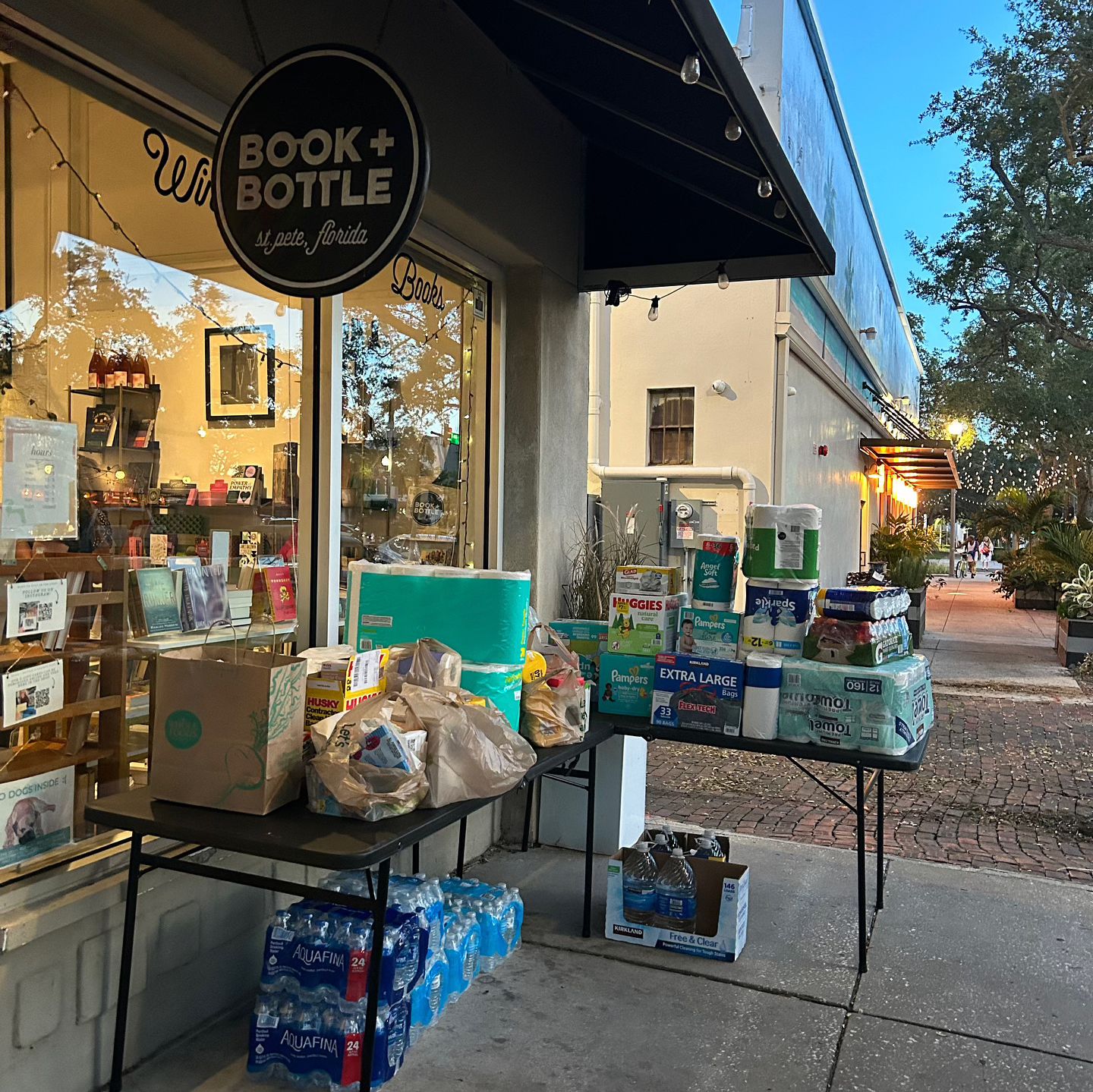 Book + Bottle, St. Petersburg: "Hello everyone. We are still without power and will be closed tomorrow. We will make sure to update you through our Instagram when we plan on returning to our normal business hours. Our lil shop is OKAY! And most of our staff either safely evacuated or were able to hunker down here and are stay safe. We love you so much St. Pete! Our hearts go out to everyone affected by Milton and still recovering from Helene. We will rebuild, support and be there for you! We will see you very soon!"
Book + Bottle, St. Petersburg: "Hello everyone. We are still without power and will be closed tomorrow. We will make sure to update you through our Instagram when we plan on returning to our normal business hours. Our lil shop is OKAY! And most of our staff either safely evacuated or were able to hunker down here and are stay safe. We love you so much St. Pete! Our hearts go out to everyone affected by Milton and still recovering from Helene. We will rebuild, support and be there for you! We will see you very soon!"
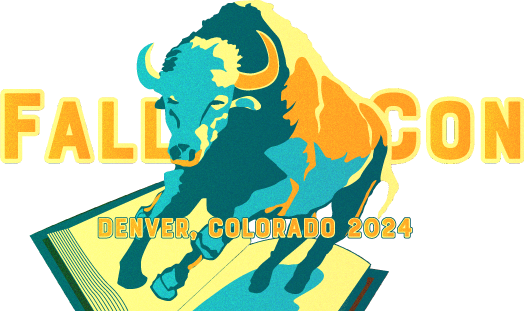 On the final day of the Mountains and Plains Booksellers Association FallCon, guests at the Authentic Voices keynote breakfast were treated to six authors speaking about their nonfiction titles, followed by a conversation with one another, moderated by Jenna Meier-Bilbo (Off the Beaten Path, Steamboat Springs, Colo.). Two strong themes emerged that framed the morning: the health of democracy and the well-being of the planet.
On the final day of the Mountains and Plains Booksellers Association FallCon, guests at the Authentic Voices keynote breakfast were treated to six authors speaking about their nonfiction titles, followed by a conversation with one another, moderated by Jenna Meier-Bilbo (Off the Beaten Path, Steamboat Springs, Colo.). Two strong themes emerged that framed the morning: the health of democracy and the well-being of the planet.
Debbie Levy, in A Dangerous Idea (Bloomsbury Children's Books, Jan. 14), her examination of the Scopes trial nearly 100 years ago, and Rick Atkinson, through the second book in his trilogy on the American Revolution, The Fate of the Day (Crown, Apr. 29), both emphasize the resonance of these historical events today. Levy pointed out that "by 1900, evolution was widely accepted." However, it was one thing if adults knew about Charles Darwin's theory, and quite another to expose teenagers to the idea. In 1925, a Tennessee statute passed that banned lessons in evolution in public schools. High school science teacher John Scopes agreed to be arrested in order to challenge the law. As Levy--a former lawyer--points out, Scopes became secondary to the larger drama playing out between William Jennings Bryan, a creationist, and Clarence Darrow, who defended evolution. The book raises the question still at the center of education: What should children be taught, and who has the power to decide?
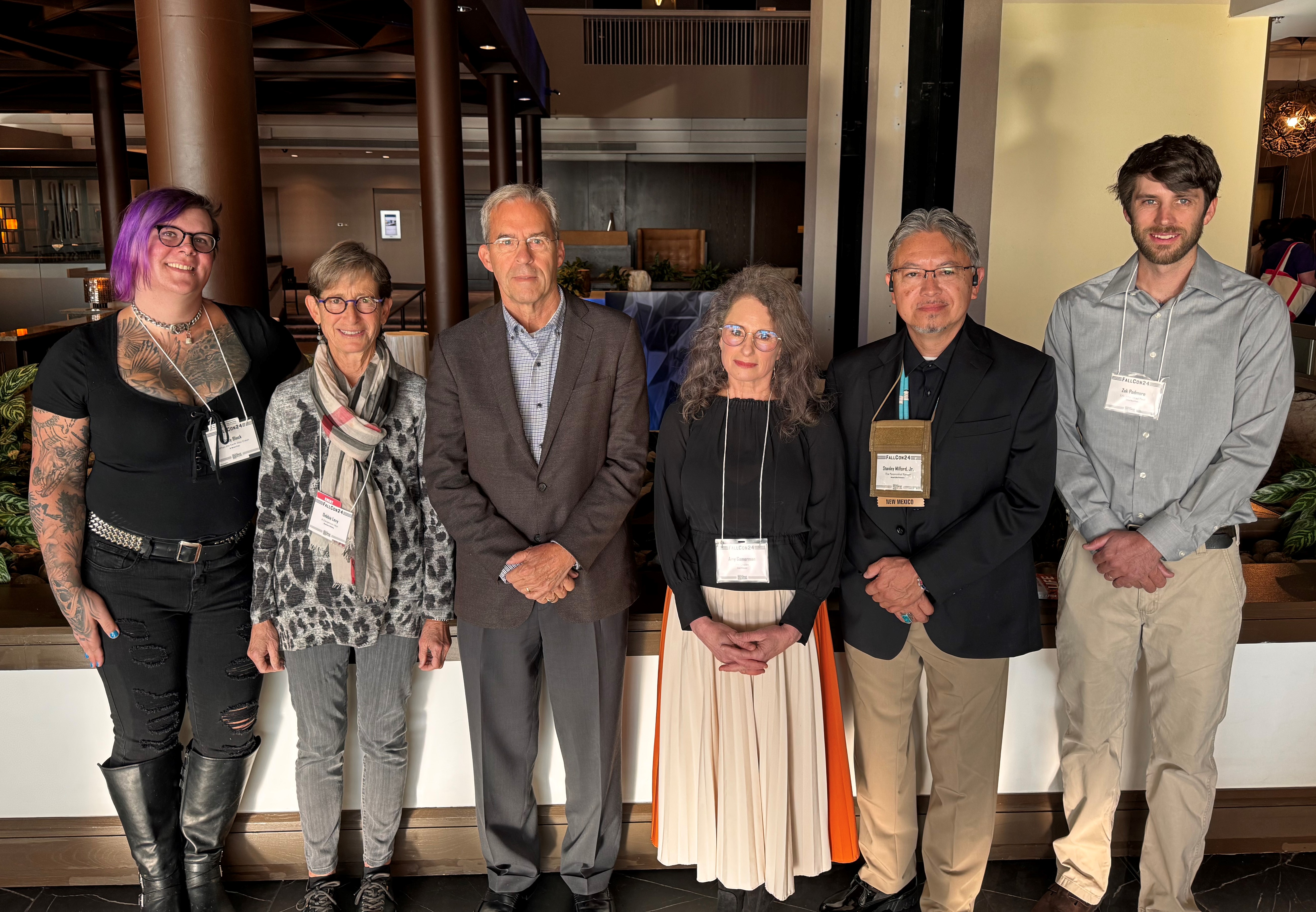 |
|
| Authentic Voices panelists: (l.-r.) Riley Black, Debbie Levy, Rick Atkinson, Amy Gamerman, Stanley Milford, Jr., and Zak Podmore. (photo: Tori Henson) | |
After Atkinson's first book in the Revolution Trilogy, The British Are Coming, this second book, The Fate of the Day, focuses on the middle years of the conflict, and the characters at the center of it: George Washington and Britain's King George III. Atkinson was among the first to view the papers of George III when Queen Elizabeth made them available to the public. "He was not the buffoon that stumbles across the stage in Hamilton," Atkinson said. "He was his own secretary, and he made his own copies, too." The author is working with Ken Burns on a PBS series about the American Revolution, scheduled to air in 2025, both as a researcher and an on-camera expert. Atkinson said the framing question for the PBS series is: "What were they willing to die for?"
In his debut book, The Paranormal Ranger (Morrow), Stanley Milford Jr. writes about ghosts and Bigfoot, Navajo skinwalkers, and hauntings. But his book is also deeply connected to the beliefs at the root of the Navajo Nation, a people living in a 27,000-mile area for which Milford was responsible as a Navajo Ranger. Milford described a pivotal event in which two young officers answered a call from an elderly woman who said Bigfoot had taken her sheep. The officers laughed, and that offended her. For the Navajo, livestock are their livelihood. Their superior told them, "These people were traumatized. You're there to help people and protect them." That's when he enlisted young Milford to become a Navajo Ranger.
In one situation, Milford encountered "66 coins that fell out of nothingness, flew across the room, and hit my partner and me. These experiences were life-changing," he said. Milford explained "as an officer, you document everything that happens." For his book, he drew from 23 cases that stretched over two decades. Of Navajo descent himself, Milford also spoke of the more than 3,000 treaties signed with the Navajo: "None of them have been kept."
If humans are meant to be the stewards of the earth, as Robin Wall Kimmerer would have it, the two men at the center of Amy Gamerman's debut book, The Crazies (Simon & Schuster, Jan. 7), would seem to fly in the face of the idea. Gamerman set out to research a Texan's $44 million, 44,000-acre spread in the Crazy Mountains of Big Timber, Mont., for "Mansion," her column for the Wall Street Journal. This Texan wanted to develop a dilapidated Victorian structure as a hotel, but a neighbor was planning to lease out some of his land as a windmill farm--in plain sight of the would-be hotel. The Texan tried to buy out the neighbor, and the neighbor flatly refused.
Gamerman became fascinated with this neighbor, who was strong enough to say no to the billionaire Texan. She characterized Big Timber as a town of people who have lived there and worked the land for generations, and the billionaires who fly in on private jets to a second (or third or fourth) home. That neighbor turned out to be Rick Jarrett, whose ancestors had run a cattle farm on that land since 1882, the year the Crow people were forced off the land by a congressional statute. Jarrett "didn't believe in climate change, but he believed in his right to make money off his land," Gamerman said. "I didn't set out to write a western, but that's what I did. A true western for a warming planet."
And speaking of warming planets, science writer Riley Black became intrigued when readers of her previous book, The Last Days of the Dinosaurs, said they most loved reading about the plants. Why? Black wondered. She believes, "It's because the plants would do something, and the animals would respond." Once again in When the Earth Was Green (St. Martin's Press, Feb. 25, 2025), Black links the interconnectedness of plants--in 15 vignettes--and dinosaurs. She also discusses the way monkeys moved from Africa to South America and continued to evolve, and how amber--tree resin--preserves fossils and plants, among many other topics. Black spoke of her writing as narrative nonfiction: "Paleontology requires science and imagination. 'What were these things like when they were alive?' The millipede, the mastodon. It's finding the story, not just doing a 'potted story' [she paused for the pun] of prehistoric plants." In her penultimate chapter about the Ice Age, Riley mentions mastodon farts. "They're chewing plants all day. Their emissions were enough to warm the planet," she said. "Now we're replicating the same."
Zak Podmore found a kind of silver lining of the warming of the planet, as he recounts in Life After Dead Pool (Torrey House Press). Growing up, Podmore heard about the breathtaking Glen Canyon from those who had walked among its beautiful heights and bends. But by 1963, it had been flooded under Lake Powell to harness a river system that supplies water to 40 million people, seven states, and 30 Native nations. In 2020, as a journalist for the Salt Lake Tribune, Podmore wrote that the Colorado River had hit record lows. The former reservoir bed had been exposed; cottonwoods were growing where the river had flowed, and beavers were returning. The book's title refers to what will happen when Lake Powell's level reaches below the tubes through which it empties into the river system; the water would be trapped with no way to reach those who need it: a dead pool. The silver lining for Podmore: "Glen Canyon is not lost forever!" Meier-Bilbo asked Podmore, "What was the roughest stretch of your 1,700-mile river trip to research the book?" He answered, "It starts in a creek, then the river grows, then shrinks after Lake Mead, and at the border of Mexico it becomes canals. The canals were the roughest stretch, camping in thickets of dry brush. These used to be wetlands with jaguars. There is no water for the Delta."
All six authors' themes brought to mind the question Amy Gamerman posed, as she thought about the two ranchers fighting it out in Big Timber, "What does it mean to be a good neighbor?" In our schools, as a citizenry who fought and still fight for democracy, who dishonor treaties, and as stewards of the planet, "what does it mean to be a good neighbor?" --Jennifer M. Brown
Karen Ugarte, bookstore & operations director of Tia Chucha's Centro Cultural in Sylmar, Calif., has become a Certified Professional Bookseller, only the second person to do so since the start four years ago of the bookselling industry's certification program, run by the Professional Booksellers School. The certification program involves four courses that last 16 weeks, with live classes and homework about every aspect of operating a bookstore.
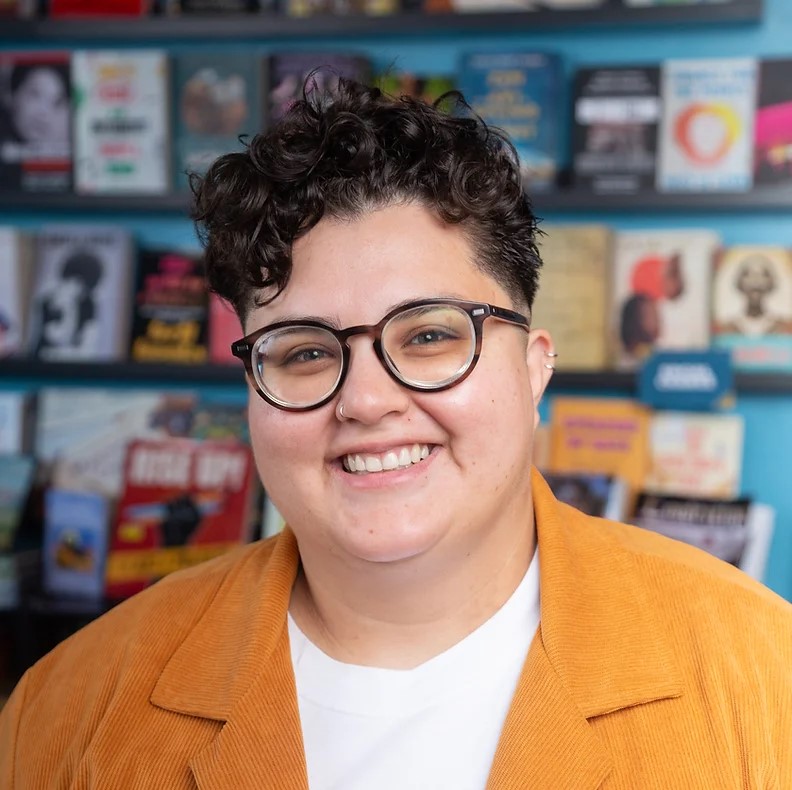 |
|
| Karen Ugarte | |
"I felt incredibly motivated throughout the process," Ugarte said. "The courses not only reassured me that I'm on the right track but also sparked new ideas for my team and me to explore. I took all the classes simultaneously, and, surprisingly, I found this approach helpful. The classes complemented each other and required me to dig deeper into the craft of bookselling. The opportunity to engage in open conversations with other booksellers--both instructors and peers--was invaluable."
She added, "I never imagined that I would have the opportunity to work with books. As a former library kid, I'm incredibly proud and grateful to work at the only bookstore in the Northeast San Fernando Valley. This certification made me feel less alone and encouraged me to continue learning, growing, and not be afraid to try new, bookish things at Tia Chucha's."
Ugarte began at Tia Chucha's as an intern. "I was excited to match with Tia Chucha's because it aligned with my passions for art, literature, and community," she continued. "I believe in the power of narrative, art, and creative expression as vital tools for community healing and care."
The Professional Booksellers School was created in 2020 to provide the first-of-its kind training in the independent bookstore world. Most independent booksellers come to their work from other industries, and while bringing varied skills and talent, they are unprepared for the intricacies and difficulties of independent bookselling. More than 900 booksellers have participated in a Professional Booksellers School course or event.
"An independent bookseller must be well-read, a good marketer, understand the minutiae of operating a retail store, be a good leader for their team, sensitive with their customers, and manage thousands of new products that are released every Tuesday for sale," said Eileen Dengler, founder and president of the Professional Booksellers School. "As was the case with Ugarte, most are self-taught, learning each day as problems arise. That is a hard way to learn and grow your business. Through PBS, we are able to share the expertise of hundreds of years of combined instructor experience, and teach skills, introduce tools, and share systems and practices to help booksellers navigate their careers and achieve their goals more quickly and with greater success. The certification program gives them confidence, validation and recognition, which is invaluable for most bookstores who often operate in isolation from other bookselling professionals."
For more information about Professional Booksellers School, click here.
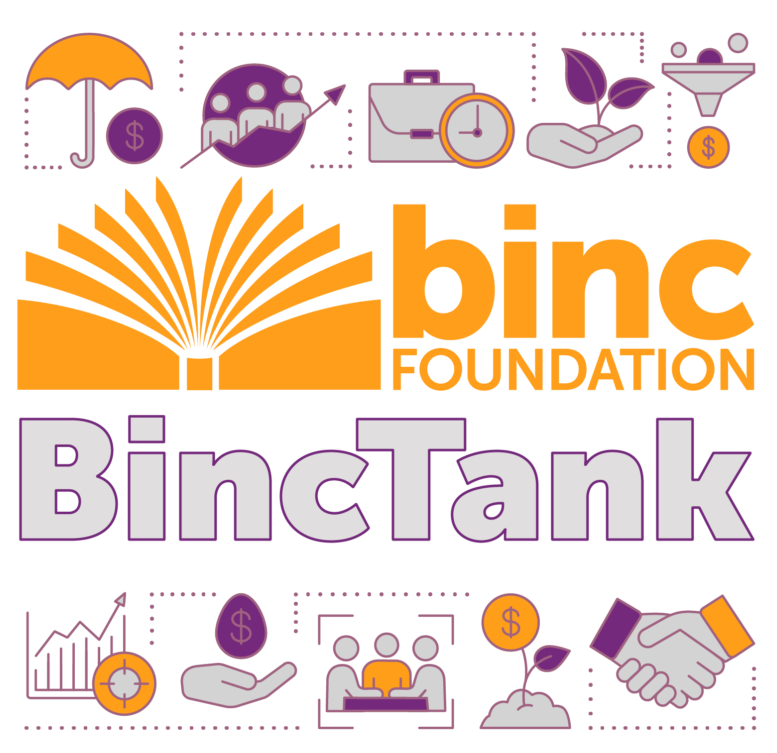 Applications will open October 13 for the second cohort of BincTank, the Book Industry Charitable Foundation's business incubator pilot program designed to increase equity in bookstore ownership by supporting entrepreneurs from historically underrepresented communities.
Applications will open October 13 for the second cohort of BincTank, the Book Industry Charitable Foundation's business incubator pilot program designed to increase equity in bookstore ownership by supporting entrepreneurs from historically underrepresented communities.
For the program, Binc is specifically looking to support BIPOC entrepreneurs and retail bookselling businesses that are physically located in their respective communities. To qualify, stores must either be yet to open or have opened no earlier than July 1, 2024. Bookmobiles, pop-up stores, and traditional bricks-and-mortar storefronts are eligible models, as are stores that want to transition from one of those models to another. The stores must also be in the U.S. or a U.S. territory.
The members of the first BincTank cohort were announced in March and graduated in August. Following the three-year pilot period, BincTank will examine results and decide how to proceed.
Applications will be open from October 13 to November 3, and will be available here.
Edward "Ed" Vaughn, founder of Detroit's First Black-owned bookstore and a civil rights icon, has died. He was 90. Michigan Chronicle reported that when he opened Vaughn's Book Store on Dexter Avenue in the 1960s, he "wasn't just selling books but creating a haven for Black Detroiters in search of knowledge, culture, and revolution. The store became a gathering place for activists, intellectuals, and community leaders, fueling the fight for civil rights and Black empowerment. Decades later, Vaughn's impact stretched far beyond the shelves of his bookstore as he transitioned from entrepreneur to state legislator, never losing sight of his mission: to uplift Detroit's Black community. Today, his legacy will be forever etched into the heart of the city, a testament to his lifelong pursuit of justice, equality, and empowerment."
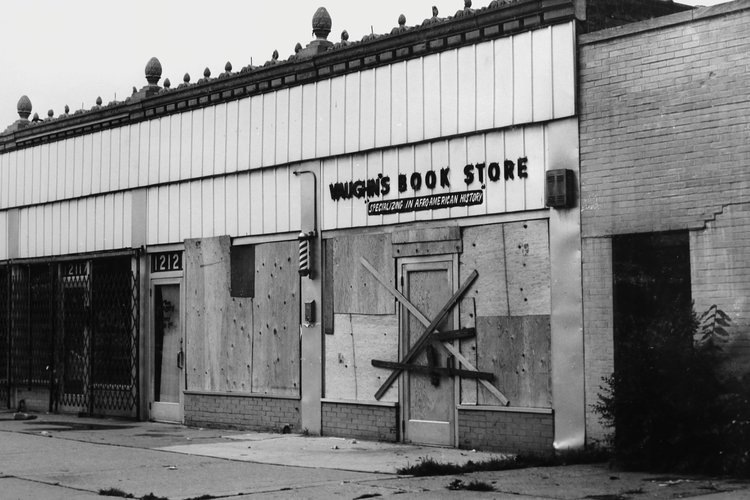 |
|
| Vaughn's Bookstore after the 1967 Detroit civil uprising (Bentley Historical Society) | |
Vaughn moved to Detroit in the 1950s to work in the auto industry, but quickly realized his purpose was rooted in the fight for civil rights. To fill the void of being unable to find Black authors that he and his friends wanted to read, he began ordering books and selling them out of his car. Soon after, he decided to open Vaughn's Book Store. "More than just a retail space, it was a beacon for African American literature, history, and thought. Vaughn's Bookstore played a vital role in the Black Power Movement by providing access to important African literature," Michigan Chronicle wrote.
Vaughn quickly became a prominent figure in Detroit's civil rights scene, taking part in protests and organizing for racial justice. He was elected to the Michigan House of Representatives for the 8th district in 1978. In 1994, he won another election to the state house and represented the 4th district.
Vaughn's influence "extended far beyond his time in the legislature. Throughout his life, he remained committed to the empowerment of the Black community in Detroit. He continued to support young leaders and activists, encouraging them to take up the mantle of leadership and continue fighting for racial and economic justice," Michigan Chronicle noted.
In 2019, the Charles H. Wright Museum of African American History honored Vaughn with the Freedom Award for his unwavering dedication and outstanding lifetime of service to the community.
After Vaughn's Book Store closed, it left a lasting imprint on the city, "serving as a reminder of the power of literature, culture, and education in advancing the struggle for equality.... It left such an imprint that the city of Detroit will soon be breathing new life into it and restoring it," Michigan Chronicle wrote.
In a statement, Detroit Mayor Mike Duggan said, "To preserve this history and Ed's legacy, my team has been working for some time to develop plans to redevelop Vaughn's Book Store, similar to what we are doing with the Ossian Sweet House. Ed's passing is all the more reason to make sure we see this through."
In 2023, the National Register of Historic Places recognized Vaughn's Book Store for its significant historical and cultural importance as a pivotal community hub and meeting point for Black activist leaders in Detroit and nationwide.
Even in his later years, Vaughn remained active in his community, attending events, lending his voice to important causes, and mentoring the next generation of activists and leaders. He often spoke of the need for continued vigilance and the importance of young people being involved in the fight for social justice.
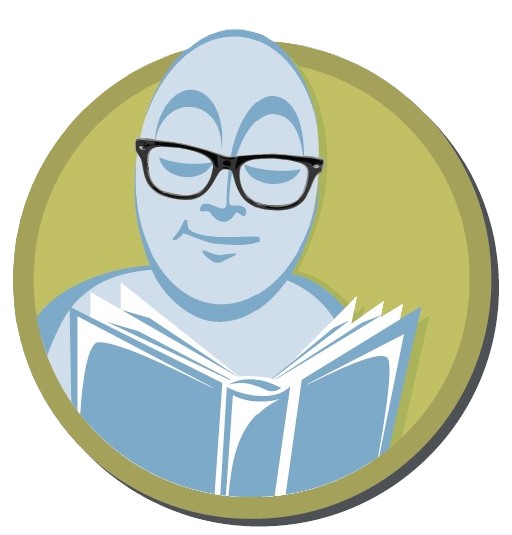 Shelf Awareness for Readers, our weekly consumer-facing publication featuring adult and children's book reviews, author interviews, backlist recommendations, and fun news items, is being published today. Starred review highlights include Final Cut by comics legend Charles Burns, whose surreal graphic novel depicts teens' creative experimentations with storytelling through film; Rift in Time by lawyer and human rights activist Raja Shehadeh, who poignantly blends family history with hope for the future of Palestine; The Elements of Marie Curie by Dava Sobel, who "paints a human portrait not of an isolated genius, but of a woman who existed in and built scientific community"; and Nose to Nose by Thyra Heder, a "smart, funny, and playful picture book" about "a massive canine misunderstanding."
Shelf Awareness for Readers, our weekly consumer-facing publication featuring adult and children's book reviews, author interviews, backlist recommendations, and fun news items, is being published today. Starred review highlights include Final Cut by comics legend Charles Burns, whose surreal graphic novel depicts teens' creative experimentations with storytelling through film; Rift in Time by lawyer and human rights activist Raja Shehadeh, who poignantly blends family history with hope for the future of Palestine; The Elements of Marie Curie by Dava Sobel, who "paints a human portrait not of an isolated genius, but of a woman who existed in and built scientific community"; and Nose to Nose by Thyra Heder, a "smart, funny, and playful picture book" about "a massive canine misunderstanding."
In The Writer's Life, translator and novelist Anton Hur discusses his work on Korean author Sung-il Kim's epic high fantasy, a genre Hur had never worked in previously but quickly grew to adore as he "focused on creating the right author's voice in English." Plus, rediscover the late Lore Segal, "a virtuosic and witty author of autobiographical novels of her life as a young Jewish Viennese refugee in England and as an émigré in America."
Today's issue of Shelf Awareness for Readers is going to 635,000 customers of more than 250 independent bookstores. Stores interested in learning more can contact our partnership program team via e-mail. To see today's issue, click here.
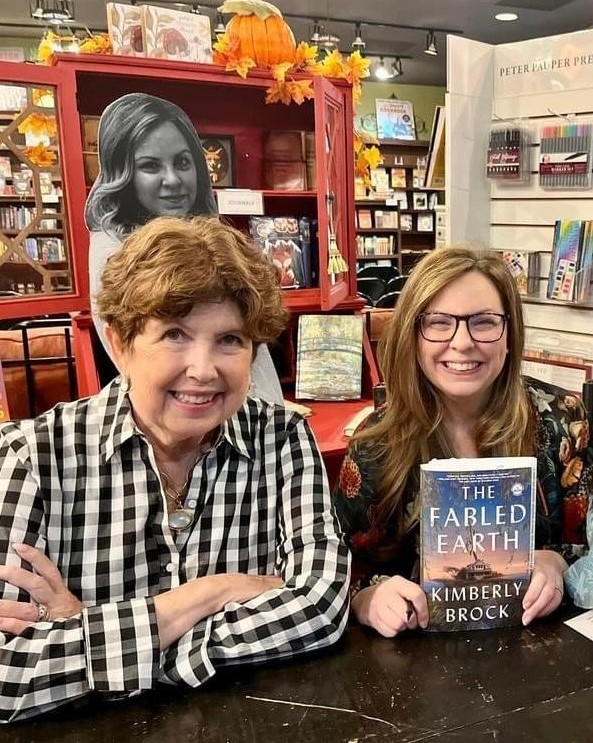 Kimberly Brock (r.) was joined by author Mary Kay Andrews for a packed event at FoxTale Book Shoppe in Woodstock, Ga., for the launch of Brock's novel The Fabled Earth (Harper Muse).
Kimberly Brock (r.) was joined by author Mary Kay Andrews for a packed event at FoxTale Book Shoppe in Woodstock, Ga., for the launch of Brock's novel The Fabled Earth (Harper Muse).
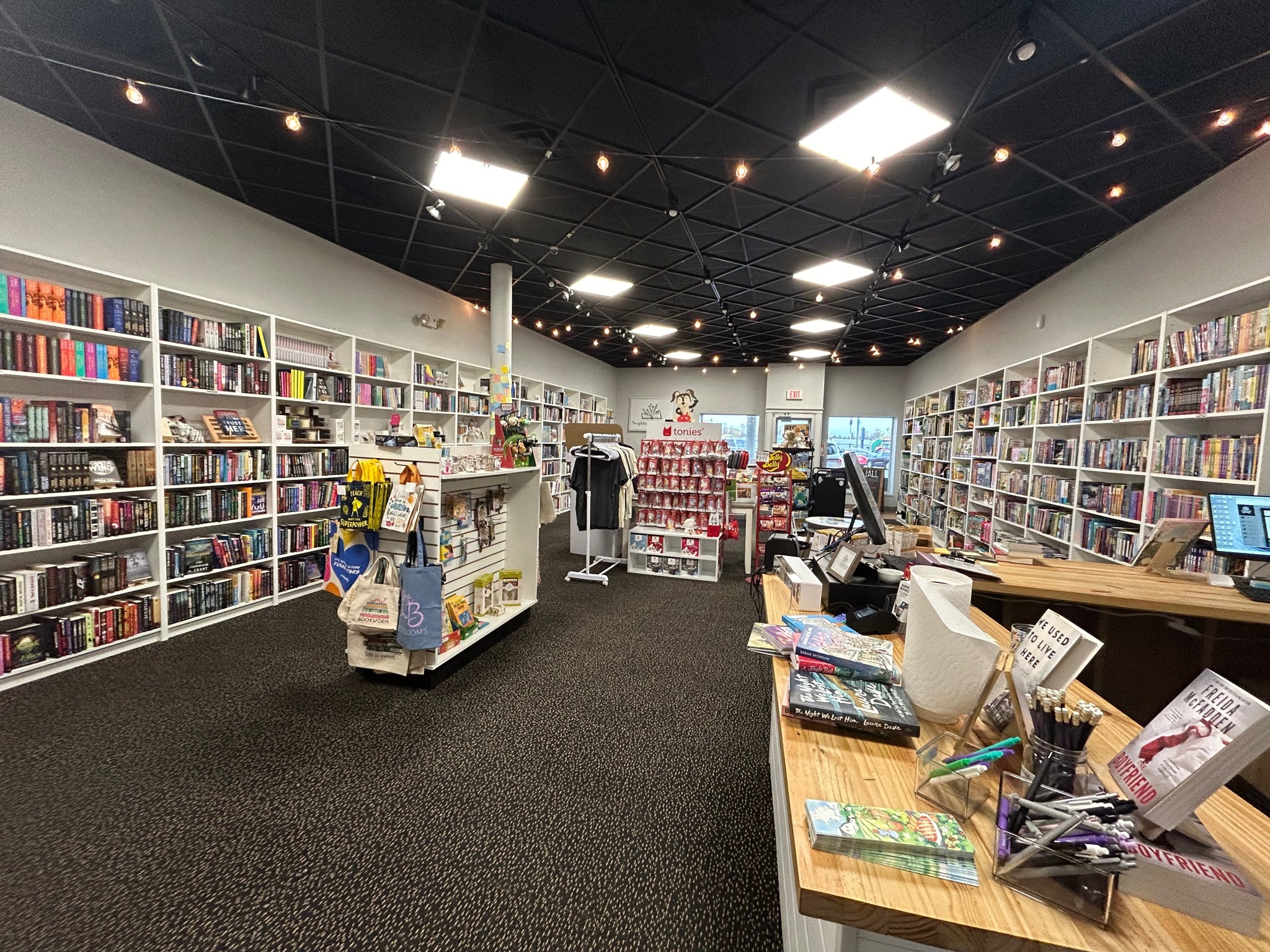 Posted on Facebook by Neighborhood Books, Presque Isle, Maine: "We're always closed on Mondays. I think we always will be. Nothing beats spending Mondays here alone catching up for a new week. Good things ahead. For now, I'm enjoying a quiet rainy day here."
Posted on Facebook by Neighborhood Books, Presque Isle, Maine: "We're always closed on Mondays. I think we always will be. Nothing beats spending Mondays here alone catching up for a new week. Good things ahead. For now, I'm enjoying a quiet rainy day here."
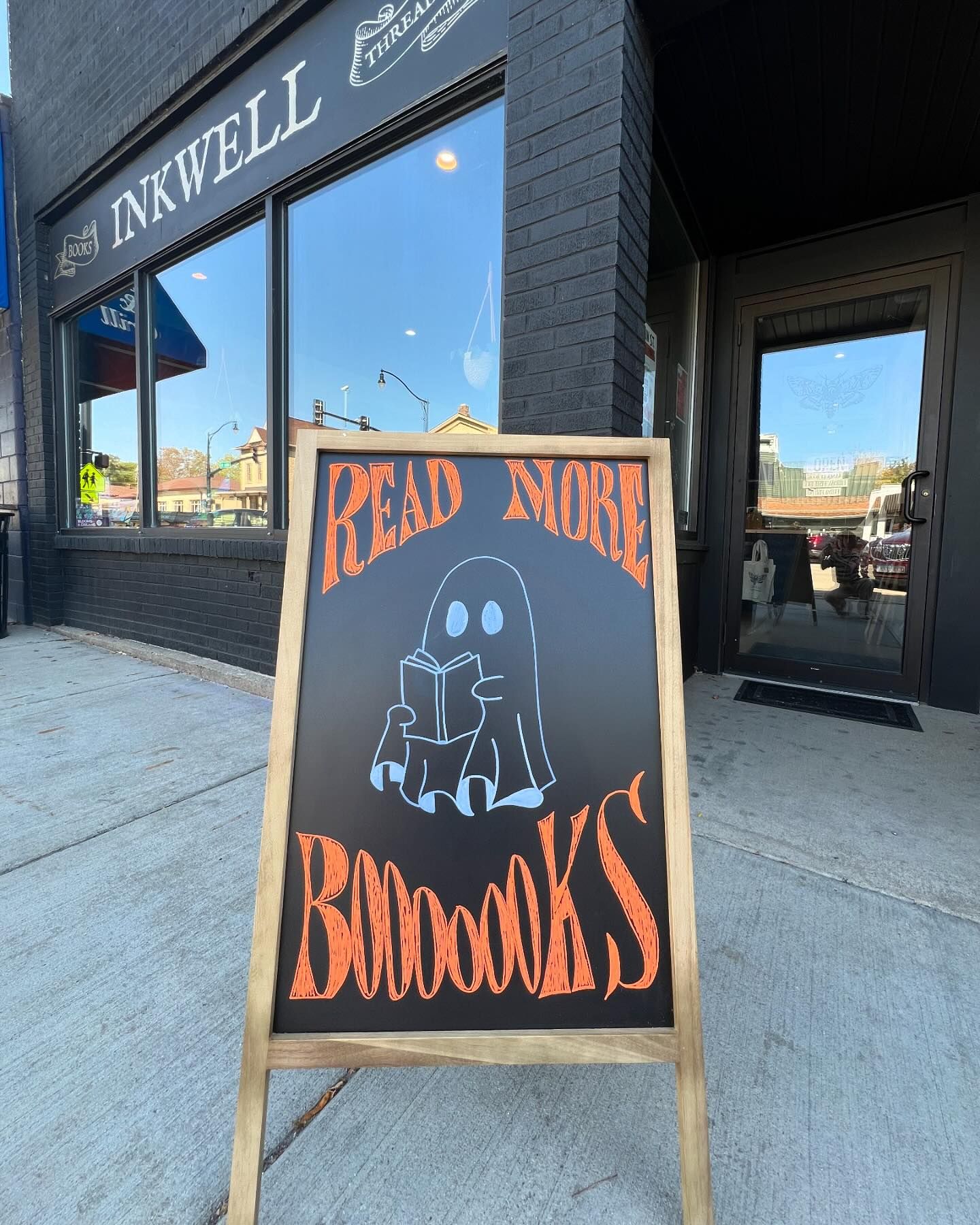 "Read more Booooooks." That was the pre-Halloween advice on the sidewalk chalkboard in front of Inkwell Books & Threads, Rockton, Ill.
"Read more Booooooks." That was the pre-Halloween advice on the sidewalk chalkboard in front of Inkwell Books & Threads, Rockton, Ill.
In the Knopf Doubleday Publishing Group publicity and marketing departments:
Emily Murphy is promoted to director of marketing, Knopf.
Matthew Sciarappa is promoted to associate director of marketing, Knopf.
Sierra Figueroa is promoted to marketing manager, Vintage.
Emily Reardon is promoted to director of publicity, Knopf.
Julie Ertl is promoted to associate director of publicity, Doubleday.
Tricia Cave is promoted to assistant director of publicity, Knopf.
Rose Cronin-Jackman has been promoted to publicity manager, Pantheon.
Noah Hoff is promoted to associate publicist, Knopf.
---
In the Gallery Books publicity department:
Lauren Carr has been promoted to associate director of publicity. She joined Gallery in 2021, after working in the Simon & Schuster Children's division.
Sydney Morris has been promoted to senior publicity manager. She joined the publicity department in 2018 after starting her publishing career at Simon & Schuster and Touchstone.
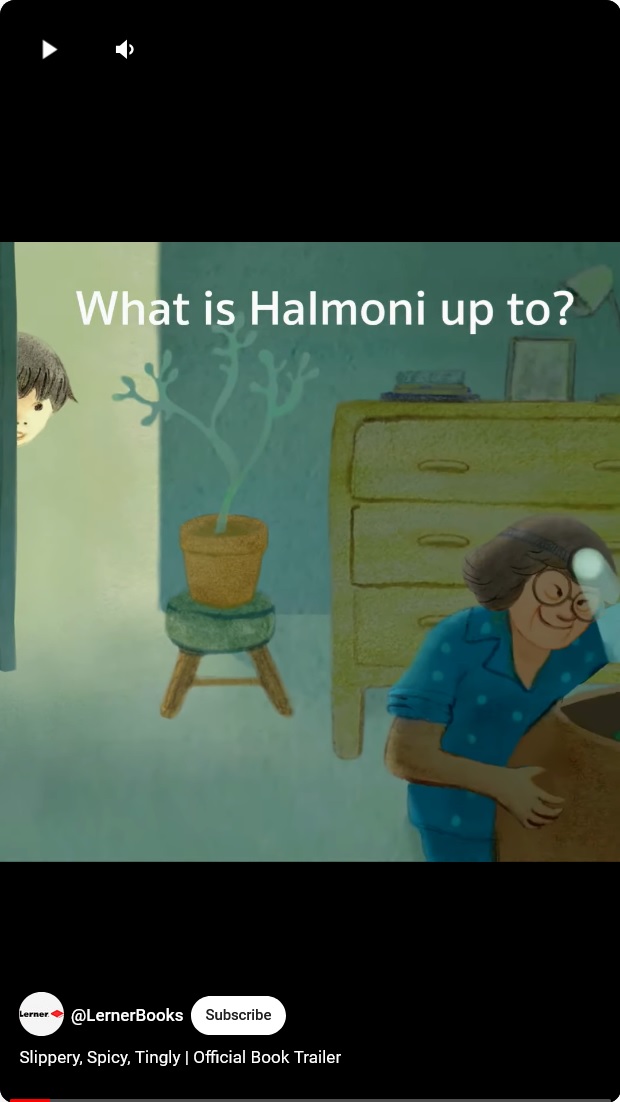 Slippery, Spicy, Tingly: A Kimchi Mystery by Yangsook Choi (Carolrhoda Books).
Slippery, Spicy, Tingly: A Kimchi Mystery by Yangsook Choi (Carolrhoda Books).
Susan Rieger's upcoming novel Like Mother, Like Mother "is getting the TV treatment," Deadline reported. Universal Content Productions has acquired the rights to the book and is adapting it with Sue Naegle and Ali Krug's Dinner Party Productions. The novel will be published by the Dial Press on October 29.
Naegle and Krug will exec produce the project, which "comes after they struck an overall deal with UCP earlier this year and put a series adaptation of Elin Hilderbrand's novel The Five-Star Weekend into development with Peacock."
Rieger said, "When I met Sue Naegle, Ali Krug, Jordan Moblo and the UCP team, I knew almost immediately that they were exactly the right people to adapt Like Mother, Like Mother. I feel so lucky to be in their hands."
The American Literary Translators Association has released shortlists for the National Translation Awards in poetry and prose. The winning translators, who receive $4,000 each, will be named October 26 at ALTA's annual conference in in Milwaukee, Wis. This year's shortlisted titles are:
Prose
The Annual Banquet of the Gravediggers' Guild by Mathias Énard, translated from French by Frank Wynne (New Directions)
Cold Nights of Childhood by Tezer Özlü, translated from Turkish by Maureen Freely (Transit Books)
The End of August by Yu Miri, translated from Japanese by Morgan Giles
(Riverhead Books)
The Hunger of Women by Marosia Castaldi, translated from Italian by Jamie Richards (And Other Stories)
Not Even the Dead by Juan Gómez Bárcena, translated from Spanish by Katie Whittemore (Open Letter Books)
Whale by Cheon Myeong-kwan, translated from Korean by Chi-Young Kim
(Archipelago Books)
Poetry
And the Street by Pierre Alferi, translated from French by Cole Swensen (Green Linden Press)
Central American Book of the Dead by Balam Rodrigo, translated from Spanish by Dan Bellm (FlowerSong Press)
A Friend's Kitchen by Al-Saddiq Al-Raddi, translated from Arabic by Bryar Bajalan with the poet Shook (The Poetry Translation Centre)
Ovid's Metamorphoses by Ovid, translated from Latin by C. Luke Soucy
(University of California Press)
Shining Sheep by Ulrike Almut Sandig, translated from German by Karen Leeder (Seagull Books)
Winter King by Ostap Slyvynsky, translated from Ukrainian by Vitaly Chernetsky and Iryna Shuvalova (Lost Horse Press)
"Our judges had the very difficult task of narrowing down this year's submissions to these two shortlists of impressive translations, ranging from the intimate to the epic in scale," said ALTA's v-p Corine Tachtiris. "In a year where AI is dominating the headlines, these translations all attest that AI will never be able to replace the artistry, nuance, and risk that characterizes the work of human translators."
---
Six finalists have been selected for the 2024 Barnes & Noble Discover Prize, honoring the "most exceptional debut novels" of the year. The winner will be announced October 21. The finalists:
Martyr! by Kaveh Akbar (Knopf)
Pearly Everlasting by Tammy Armstrong (Harper)
Swift River by Essie Chambers (Simon & Schuster)
888 Love and the Divine Burden of Numbers by Abraham Chang (Flatiron Books)
Piglet by Lottie Hazell (Holt)
Whale Fall by Elizabeth O'Connor (Pantheon)
B&N category manager for fiction Lexie Smyth commented, "One of the best parts of being a bookseller is identifying and elevating debut voices that will go on to become part of the canon. This shortlist of finalists for the Discover Prize is the result of many lively, impassioned conversations among my colleagues, and the six novels selected represent authors who are well on their way to becoming household names. We are so grateful to these authors for their brilliant work and are so proud to put this list forward for our readers."
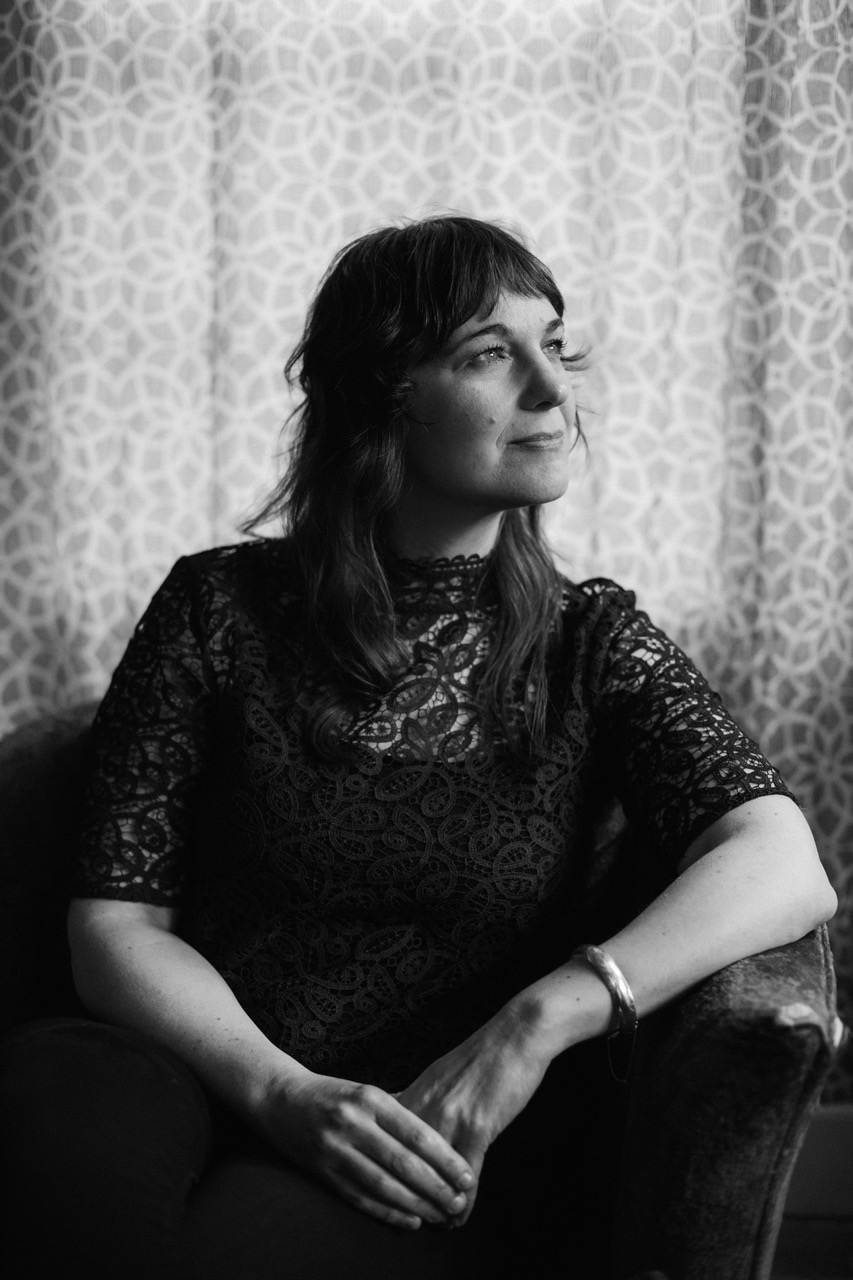 |
|
| photo: Jason Quigley | |
Alissa Hattman's writing has appeared in Carve, the Rumpus, the Gravity of the Thing, Propeller, surely, and elsewhere. Hattman has taught writing classes and workshops for more than 15 years and has worked as a fiction editor, book reviewer, zine librarian, writing group facilitator, and artist-in-residence at several arts centers, most recently at Gullkistan, Center for Creativity in Iceland. Originally from North Dakota, she now lives and teaches in the Pacific Northwest. Hattman is the author of the novella Sift (The 3rd Thing, September 5, 2023), which was shortlisted for the 2024 Ursula K. Le Guin Prize for Fiction.
Handsell readers your book in 25 words or less:
Sift is a speculative novella that follows two women as they journey through the heart of a mountain.
On your nightstand now:
I tend to read short essays, interviews, or writer correspondence before bed. Right now, it's Between Friends: The Correspondence of Hannah Arendt and Mary McCarthy, edited by Carol Brightman; Braiding Sweetgrass by Robin Wall Kimmerer; The Book of (More) Delights by Ross Gay; and the current issue of the Paris Review. During hard times, I'll read a passage from When Things Fall Apart by Pema Chödrön.
Favorite book when you were a child:
If I had to choose just one, it would be Charlotte's Web. I read all of E.B. White's children's books when I was a kid. His language is so precise and tender. I appreciated the honest depiction of mortality in the book. I had a lot of complicated feelings about death when I was a child and reading Charlotte's Web validated those feelings. It's a book as much about death as it is about the life-affirming act of writing. I know it inspired me to write. It was probably also the reason I became a vegetarian.
Your top five authors:
Clarice Lispector for her urgency and mystery and strange sentences; Robin Wall Kimmerer for her keen insight and expansive ecological consciousness; Toni Morrison for her radical imagination; Herman Melville for his complex depictions of desire and conflict; and Ursula K. Le Guin for undoing my notions of narrative and helping me see new worlds.
Book you've faked reading:
I've never read any of the Harry Potter books and I've never watched any of the movies, but I worked in book sales during the Potter craze and basically had to fake it, which wasn't hard.
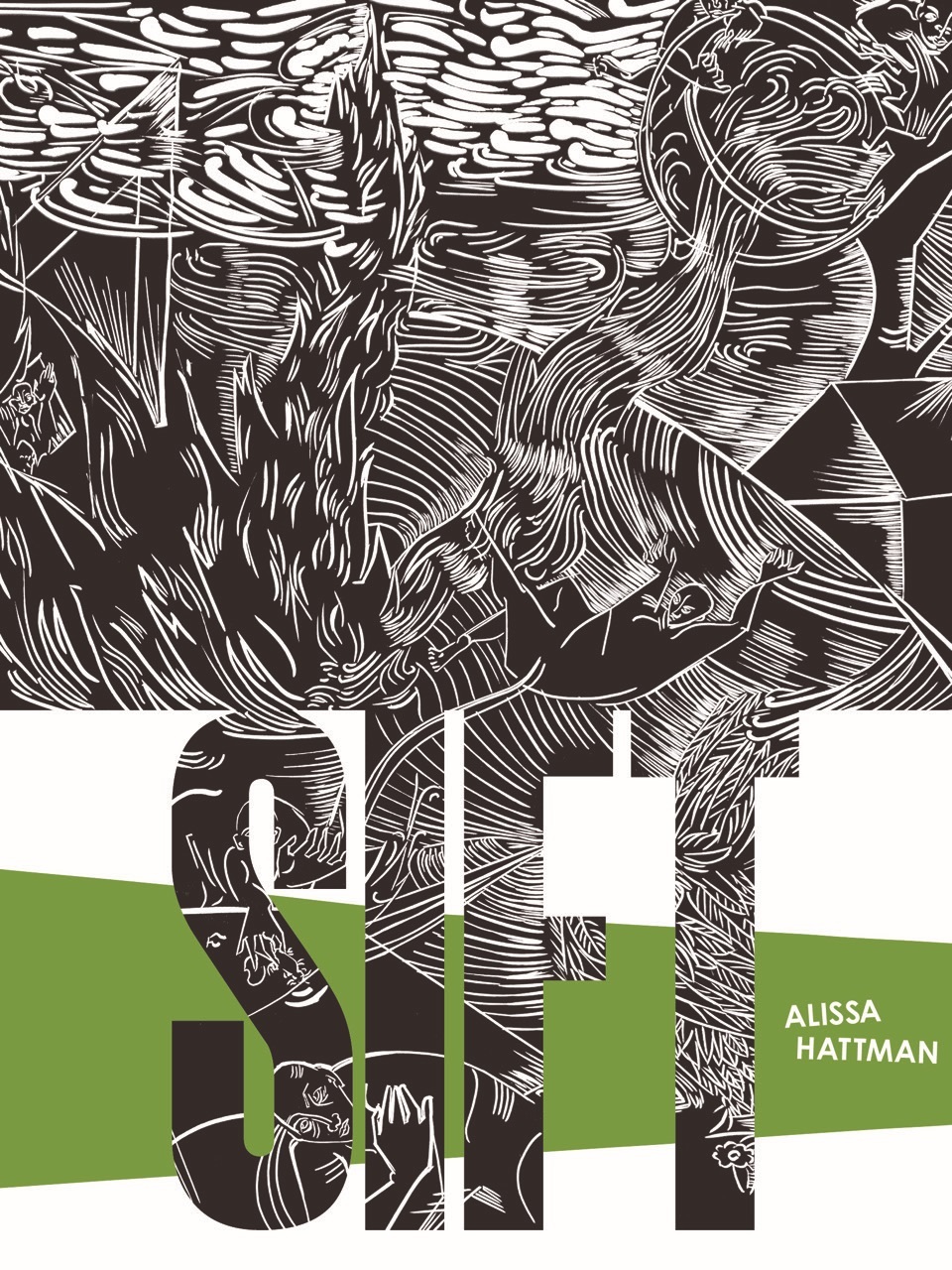 Book you're an evangelist for:
Book you're an evangelist for:
This changes every year, but this year I've enjoyed talking with people about Christine Lai's Landscapes, which I loved. It's a book that takes risks by inviting intersections of art, feminism, and environmentalism, making leaps in time, and inhabiting precarious states of grief, trauma, and survival in an uncertain world. There's this wonderful sense of resiliency in the story, a making do with what remains.
Book you've bought for the cover:
I bought Claudia Piñeiro's Elena Knows because of the gorgeous cover design. Charco Press's overall curation and aesthetic is marvelous.
Book you hid from your parents:
I can't remember hiding any books from my parents other than my journal. I have a memory of reading my mom's copy of Clarissa Pinkola Estés's Women Who Run with the Wolves when I was 13 and not telling her that I read it. I remember, reading the book, feeling this awkward, itchy sense of empowerment; as a teenager, I wasn't sure what to do with that feeling and I suppose it wasn't something I was ready to talk about with her. We did eventually end up having a great discussion about the book later when I was in college.
Book that changed your life:
The Bluest Eye by Toni Morrison was the first time I experienced a book teaching me how to read it. I first read it in middle school, and I struggled to understand what was going on for most of the book, but still I found the writing absolutely gripping and couldn't stop. Slowly, I was able to figure out what was happening in the story. I had to read the whole book again, but it really changed the way I engaged with the world. I could provide a million examples, but the first that comes to mind is that I can't look at marigolds without thinking of Pecola's story. The Bluest Eye taught me the type of patience and participation that good literature requires, and it was thrilling.
Favorite line from a book:
I can't choose a favorite, but this is one that I love:
"My most primary struggle for the most primary life would open with the calm, devouring ferocity of desert animals." --Clarice Lispector, The Passion According to G.H.
Five books you'll never part with:
Cane: A New Critical Edition by Jean Toomer
Stranged Writing: A Literary Taxonomy, an anthology published by The Gravity of the Thing
Float by Anne Carson
Teaching to Transgress by bell hooks
The Books of Earthsea: The Complete Illustrated Edition by Ursula K. Le Guin, illustrated by Charles Vess
Book you most want to read again for the first time:
Earthlings by Sayaka Murata. This is such a wonderfully strange, utterly surprising, intense book. I loved it. My first reading was informed by a manufacturer glue error with the binding, and pages from the book kept falling out as I read. The story was so strange that for a minute I was convinced that this was happening on purpose! I returned the book, and look forward to re-reading, but the weirdness probably won't ever match that first time.
Five books from small presses that you love:
Arctic Play by Mita Mahato (The 3rd Thing)
#TravelingWhileTrans by Jessica Wadleigh (zines + things)
Loaners by Ben Hodgson and Laura Moulton (Perfect Day Publishing)
Sister Golden Calf by Colleen Burner (Split/Lip Press)
Wild Milk by Sabrina Orah Mark (Dorothy, a publishing project)
The Champagne Letters by Kate MacIntosh (Gallery Books, $28.99 hardcover, 352p., 9781668061886, December 10, 2024)
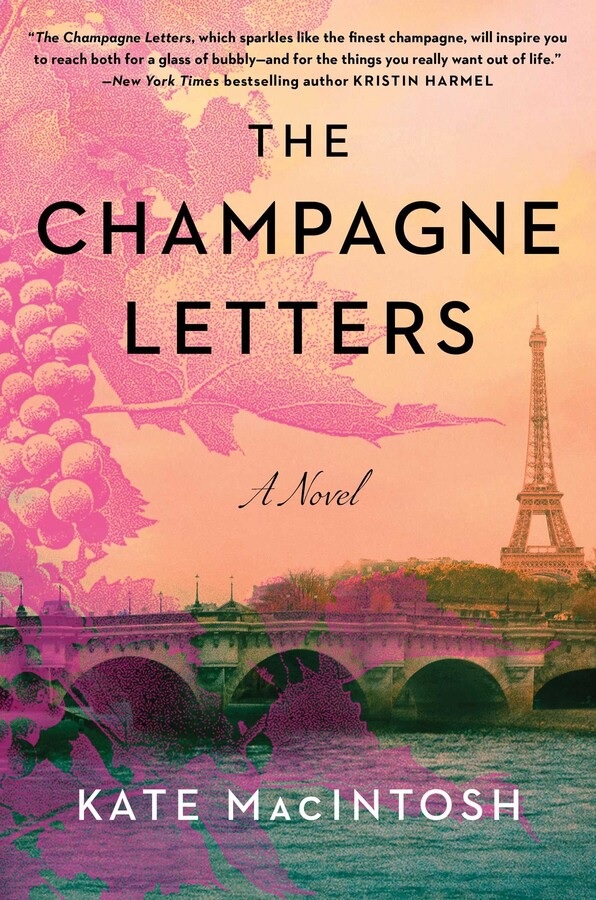 Kate MacIntosh's debut novel, The Champagne Letters, fizzes with Parisian adventures, narrow escapes, and women determined to create their own second chances.
Kate MacIntosh's debut novel, The Champagne Letters, fizzes with Parisian adventures, narrow escapes, and women determined to create their own second chances.
Still reeling from her divorce a year ago, Natalie Taylor flees the chaos of moving boxes for a spur-of-the-moment trip to Paris. On arrival, a mix-up leaves the hotel staff with the impression that Natalie is a widow--grieving her husband's death instead of the demise of their marriage. Too embarrassed to correct this mistake, Natalie nonetheless finds solace in her Parisian adventure and in the company of Sophie, a young widow who works at the hotel and who introduces Natalie to another, more famous, widow: Barbe-Nicole Clicquot, the force behind the Veuve Clicquot champagne empire.
MacIntosh alternates between Natalie's 21st-century experiences, which include poring over a collection of letters from Barbe-Nicole to her great-granddaughter, Anne, and Barbe-Nicole's first-person narrative of steering the house of Clicquot through tribulation and triumph. Barbe-Nicole begins each letter with some sage (sometimes salty) advice to Anne, then recounts her long struggle to recover from her husband's death and assert her authority as the owner of the Clicquot vineyards. Barbe-Nicole narrates her fight to remain independent in the face of massive societal pressure: her parents and others urged her to marry again, to give up the vineyards, to focus only on caring for her daughter. Though Barbe-Nicole worried over her own deficiencies as a mother, she became increasingly determined to make her champagne the best in the business, and to circumvent Napoleon's blockades and the other harmful effects of his rule.
As Natalie explores Paris on her own and with Sophie, she quickly becomes enamored of both her new surroundings and a handsome Frenchman, Gabriel, who provides the perfect distraction for Natalie's wounded heart. But, like Barbe-Nicole, Natalie must face her past in order to move forward into her future. MacIntosh gives Natalie a classic rom-com tour of Paris (new clothes, fine wine, delectable pastries), but also delves into the end of Natalie's marriage and the ways she has played it safe--too safe--in her personal and professional life. When a few of Natalie's Parisian risks turn out to have unforeseen consequences, she digs deep to find the courage and chutzpah to reclaim what she's lost. Her growing determination mirrors Barbe-Nicole's fierce resolve to outsmart Napoleon, fix the problem of sediment in her wine bottles, keep her daughter safe, and retain her independence--even more precious than her famed 1811 champagne.
Bubbling with intrigue, surprises, and rich historical detail, MacIntosh's debut is a toast to courageous women past and present. --Katie Noah Gibson, blogger at Cakes, Tea and Dreams
Shelf Talker: Kate MacIntosh's sparkling debut novel fizzes with intrigue, Parisian adventures, and the courage of two women determined to make their own luck.
Here's a story we all can tell; the variations are nearly infinite. It's a tale about finally making a pilgrimage to the bookshop that has been on your "must visit" list for a long, long time. It's about being there, browsing the stacks, buying a book or two or three; savoring the moment and then, years later, being able to recall that moment at will.
If you're reading this, you've had the experience. I know you have. Tell me about it sometime. What was your "must-visit" bookshop pilgrimage like?
A couple of things triggered thoughts about this recently. The first was an article ("Why I always visit a local indie bookstore on my travels") I read in the Straits Times. "I always plan a visit to a local independent bookstore early into my travels to find my bearings and pick up a book related to the place," Shawn Hoo wrote. "A city without bookstores is a nightmare for a traveler like me--it is like visiting a city without maps."
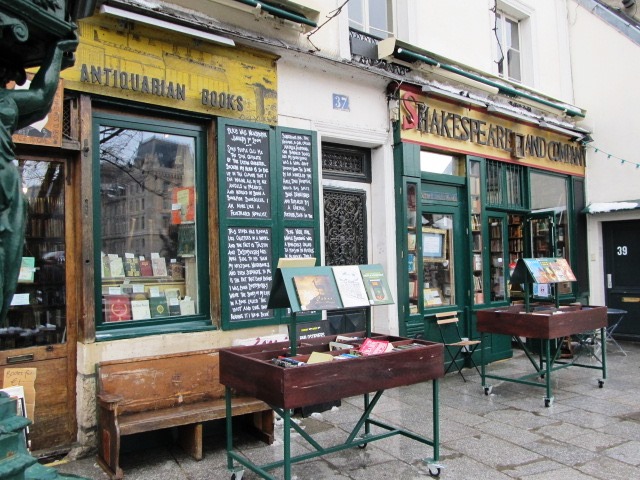
Biles opened the program by wondering, "when a volume chosen from a million-strong catalog can be fired through your window by a drone barely an hour after you've ordered it, or when the very same book, searchable, resizable, updatable, shareable, can appear on your e-reader in a matter of seconds, what good do the dusty, inefficient, brick-and-mortar relics we call bookshops still serve?"
A conversation starter if there ever was one, and the panel's discussion is well worth a listen, but a slightly off-topic comment during the q&a sent my mind in another direction.
A woman mentioned that the last few times she'd been in Paris, she wasn't able to get inside Shakespeare and Company due to the long queue: "I'm wondering how you manage the fact that you are essentially a tourist landmark/bookshop between the sales of books and trying to sell books, but also having to deal with people who might want to visit the shop and not necessarily buy something."
Biles replied, "It's been harder and harder to manage, and we're a small bookshop in a 17th-century building. We took the decision to have a queue because we wanted the experience once you're inside to be as close to being in a normal bookshop as possible. And to anybody in the room or anybody listening, I should say that the queue does move pretty fast. But one of the very gratifying things is that people do buy books.
"And one of the things that actually drives me mad is every so often you will see comments on Google or things like that, and people say, oh, it's just a tourist attraction full of young women who want to take photos for their Instagram accounts. And the first thing you should say is that without young women, the book industry is dead. They are the people who buy books, who read books, who engage with books more than any other demographic.
"And these young women are not just coming to take photos. They come, they buy the books and they buy serious, engaging literature, philosophy, politics, much more than the men they bring in with them, actually. And I'm sure much more than the men who are writing these kind of comments online."
For many years, Shakespeare and Company was my "must-visit" bookshop, and since listening to the podcast, I've had pleasant flashbacks to my pilgrimage there about a decade ago.
On our third day in Paris, we'd headed out early to the Musée d'Orsay, where we encountered a noisy queue, snaking around the plaza and down the street. We declined to join them, opting instead to keep walking toward our second planned destination, which would, we were certain, offer much-needed warmth and shelter to a pair of weary readers.
It did. There was no queue outside Shakespeare and Company that day, and inside, a blissful near silence. We browsed for a long time, exploring the ground floor stacks as well as the library upstairs.
I also observed the booksellers, who were young and knew their stuff, fielding questions in French from the locals; changing direction and language instantly for an Australian man's query about "social justice in literature"; then deftly handling an American woman's request for some Ken Follett, Nora Roberts or Pat Conroy. It was a variation on a drill frontline booksellers anywhere would recognize.
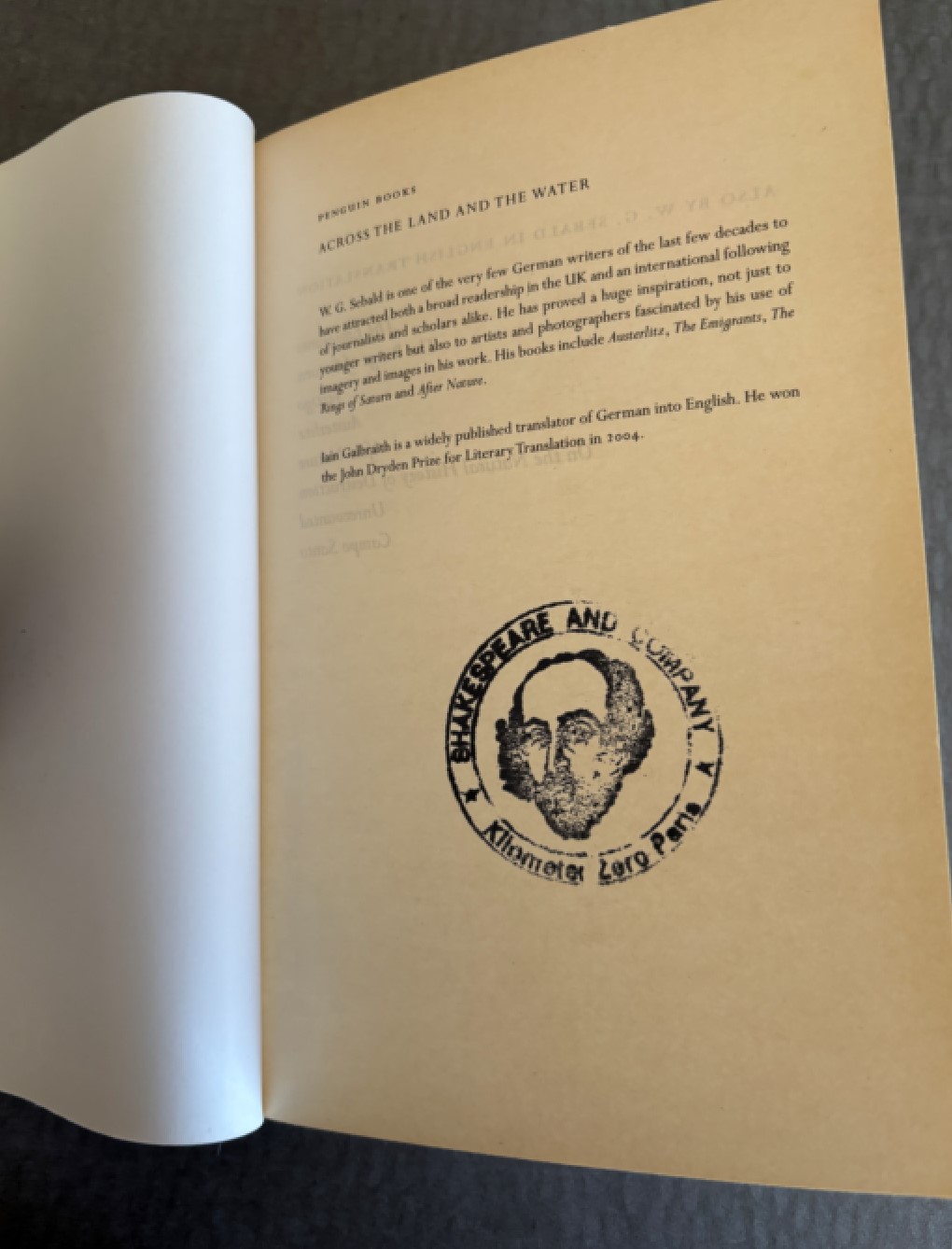 We bought several books, of course. In the iron-gated and densely stocked poetry section, I found some keepers, including W.G. Sebald's Across the Land and Water. " 'Reading' in Sebald's poetry, however, is a process that not only responds to text. His poems read paintings, towns, buildings, landscapes, dreams and historical figures," Iain Galbraith writes in the translator's introduction.
We bought several books, of course. In the iron-gated and densely stocked poetry section, I found some keepers, including W.G. Sebald's Across the Land and Water. " 'Reading' in Sebald's poetry, however, is a process that not only responds to text. His poems read paintings, towns, buildings, landscapes, dreams and historical figures," Iain Galbraith writes in the translator's introduction.
Eventually, we carried our new treasures, stamped with Shakespeare and Company's iconic logo, outside and strolled across the Pont au Double, a bookish pilgrim's path if there ever was one, to Notre Dame cathedral.